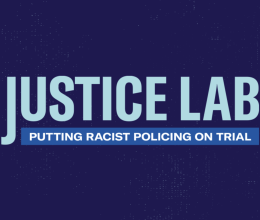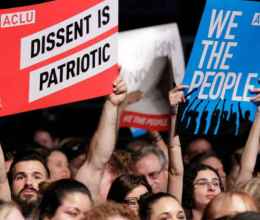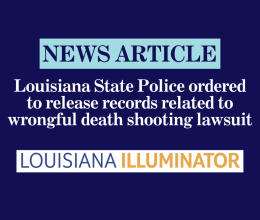At 17, Travis Hayes was wrongfully accused of being the getaway driver in the botched holdup of a convenience store. Forensic evidence from the crime scene excluded him. Two members of the jury voted against his conviction.
In almost every other state, this would have resulted in a hung jury and a mistrial. But in Louisiana, where prosecutors only have to convince 10 out of 12 jurors of a defendant’s guilt, Hayes was convicted and sent to prison. He served nine years before being exonerated by DNA evidence in 2007.
Hayes, a Black man with an IQ consistent with an intellectual disability, is one tragic example of the damage done by Louisiana’s non-unanimous jury rule, a holdover of white supremacy that Louisiana shares with only one other state.
Right now in Louisiana, even if two people on a jury believe you’re innocent you can still be found guilty. So much for reasonable doubt.
Now a broad bipartisan coalition has come together to urge Louisianans to abolish this unjust practice by voting yes on Amendment 2 this fall.
Louisiana’s rare majority-verdict law dates back to 1898 when white supremacists at the state constitutional convention wanted to increase the supply of free prison labor and nullify the voting power of black jurors.
Their solution: lower the threshold for felony convictions by removing the requirement that juries be unanimous. They calculated that even if two Black jurors made it on a jury, their votes would be canceled out by the majority, and the defendant would still be convicted.
Ever since, this noxious relic of Jim Crow has remained stubbornly enshrined in Louisiana’s Constitution. It’s worked exactly as it was designed: increasing the prison population, perpetuating racial disparities, and sending innocent people like Travis Hayes to prison.
The basic standard of proof in criminal cases requires guilt to be proven beyond a reasonable doubt. By allowing defendants to be convicted over the objections of some jury members, Louisiana’s non-unanimous jury rule subverts this fundamental rule of American criminal law.
After all, what could be more clearly indicative of “reasonable doubt” than two jurors who are convinced of a defendant’s innocence?
When it comes to deciding whether someone spends the rest of their life in prison, convincing most of a jury is not enough. That is why 48 states and the federal government require that jurors reach a unanimous verdict for criminal convictions.
The non-unanimous jury rule helped make Louisiana — until recently — the world’s leading incarcerator, and there is new evidence that it has exacerbated racial disparities in our justice system as well.
An analysis by The Advocate found that Black defendants were more likely than white defendants to be convicted over the objections of jury members. “Although the majority-verdict law disadvantages all defendants,” they wrote, “its effects on black people accused of crimes are especially profound.”
Today, Louisiana stands at a turning point.
Thanks to a bipartisan coalition of reformers and advocates, Louisiana has finally begun to shed its reputation as the prison capital of the world. This fall, voters will have an opportunity to take another important step toward true justice by bringing Louisiana in line with the 48 other states that require unanimous verdicts in felony cases.
By voting “yes” on Amendment 2 in November, Louisianans can finally right the wrong done more than a century ago and prevent people like Travis Hayes from being convicted without being proven guilty beyond a reasonable doubt.







